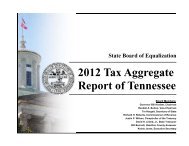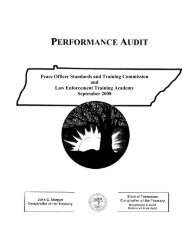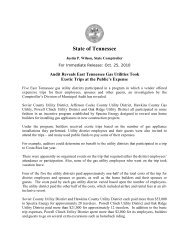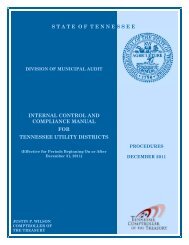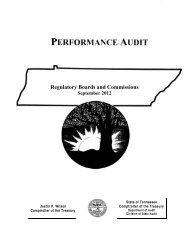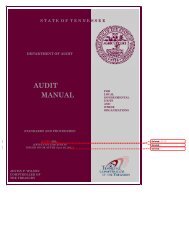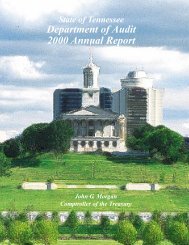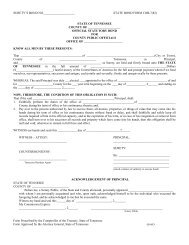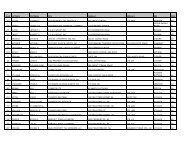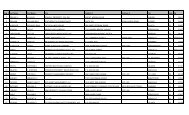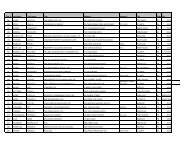On 06/30/2013 the Audit Manual was updated. For a markup copy ...
On 06/30/2013 the Audit Manual was updated. For a markup copy ...
On 06/30/2013 the Audit Manual was updated. For a markup copy ...
Create successful ePaper yourself
Turn your PDF publications into a flip-book with our unique Google optimized e-Paper software.
Miscellaneous - Section APP.E<br />
APP.E-6<br />
b. Recommendations for improvement.<br />
c. Comments on corrective action planned.<br />
d. Concurrence or nonconcurrence of appropriate official with <strong>the</strong><br />
audit finding.<br />
e. Comments on <strong>the</strong> disposition of prior year findings.<br />
4. What qualifications should an auditor have?<br />
<strong>For</strong> <strong>the</strong> audit to be accepted by state and federal governments, <strong>the</strong> auditor must be ei<strong>the</strong>r a<br />
certified public accountant licensed to practice in Tennessee, or a member of <strong>the</strong> audit staff of<br />
<strong>the</strong> Tennessee State Comptroller’s Office. Out-of-state firms auditing organizations that are not<br />
based in <strong>the</strong> State of Tennessee must comply with <strong>the</strong> requirements of <strong>the</strong> applicable state(s).<br />
The auditor should have adequate training and experience in governmental accounting and be in<br />
good standing in <strong>the</strong> profession. The auditor in charge of <strong>the</strong> field work should have a practical<br />
working knowledge of applicable state and federal laws and regulations. The auditor should be<br />
independent under <strong>the</strong> requirements of <strong>the</strong> American Institute of Certified Public Accountants<br />
(AICPA) and Government <strong>Audit</strong>ing Standards in relationship to <strong>the</strong> engagement. The audit firm<br />
should be currently registered with <strong>the</strong> State Board of Accountancy and should have<br />
participated in an external quality control review at least once every three years, conducted by<br />
an organization not affiliated with <strong>the</strong> firm. (A <strong>copy</strong> of both <strong>the</strong> most recent external quality<br />
control review report and letter of comment should be provided to <strong>the</strong> local government.) All<br />
audit staff assigned to <strong>the</strong> audit should have <strong>the</strong> necessary hours of continuing professional<br />
education required by Government <strong>Audit</strong>ing Standards.<br />
5. How important is cost in making a decision?<br />
Section 12-4-1<strong>06</strong>, Tennessee Code Annotated—Contracts for professional services<br />
Contracts by counties, cities, metropolitan governments, towns, utility districts<br />
and o<strong>the</strong>r municipal and public corporations of <strong>the</strong> state, for legal services, fiscal<br />
agent, financial advisor or advisory services, educational consultant services, and<br />
similar services by professional persons or groups of high ethical standards, shall<br />
not be based upon competitive bids, but shall be awarded on <strong>the</strong> basis of<br />
recognized competence and integrity. The prohibition against competitive bidding<br />
in this section shall not prohibit any entity enumerated from interviewing eligible<br />
persons or groups to determine <strong>the</strong> capabilities of such persons or groups.<br />
6. How is <strong>the</strong> auditor selected?<br />
The State Attorney General, in an opinion dated March 7, 1985, stated that governmental units<br />
are prohibited by statute from awarding [audit] contracts on <strong>the</strong> basis of competitive bidding. In<br />
3



